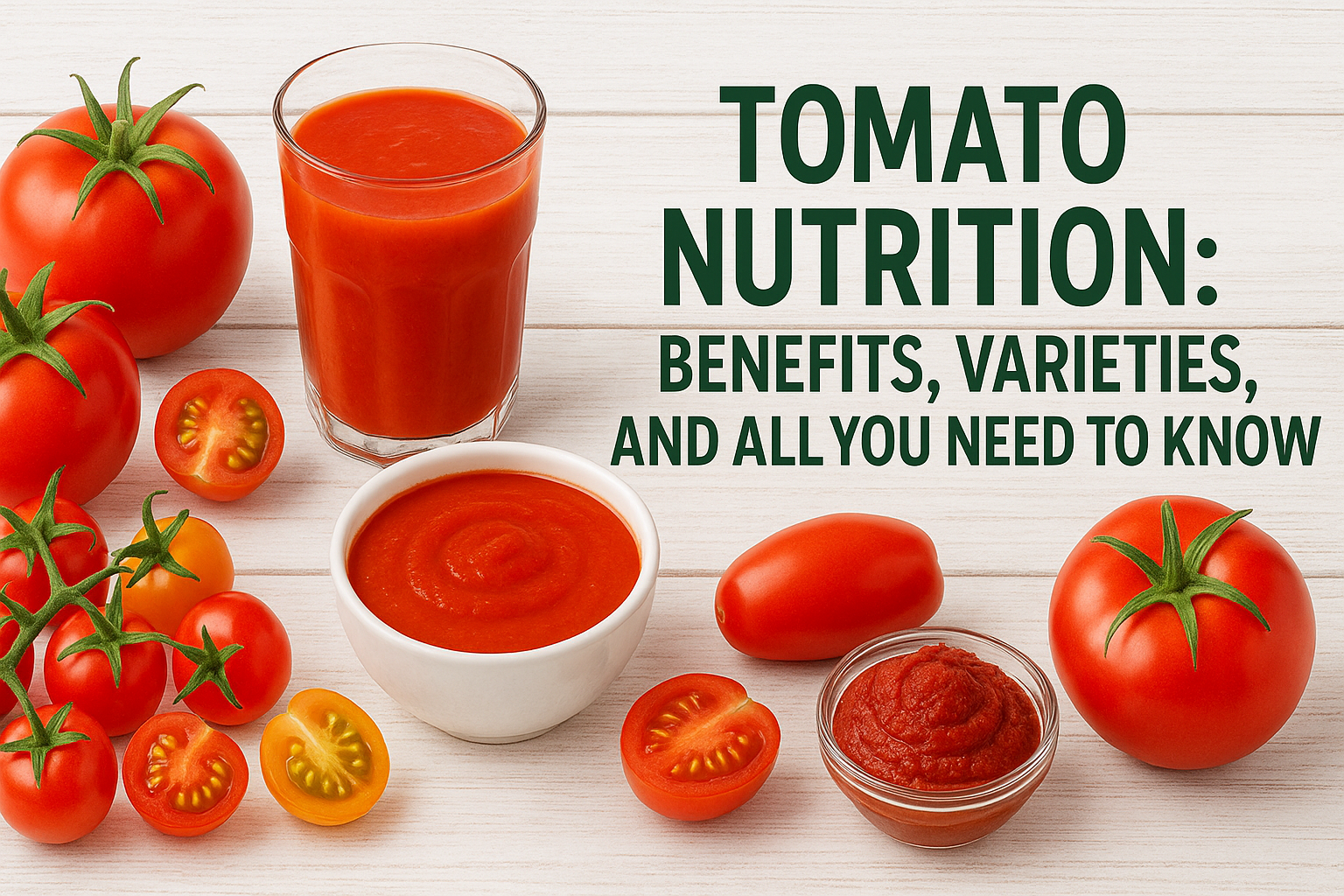Tomatoes and Nutrition: Heart Health, Weight Management, and Skin Care

Tomatoes might seem like a simple food, but their health effects are profound. Whether you’re eating them fresh, juiced, or in sauce form, tomatoes play a vital role in supporting a range of bodily functions.
Tomatoes and Heart Health
If you’re aiming to keep your heart healthy, tomatoes should be a regular on your plate. Rich in potassium and lycopene, they help regulate blood pressure, reduce cholesterol buildup, and improve overall cardiovascular function.
Lycopene in tomatoes reduces LDL (bad cholesterol) oxidation—a major contributor to heart attacks and strokes. Studies also show that people who consume lycopene-rich foods regularly have a lower risk of cardiovascular diseases.
In addition to lycopene, the fiber and potassium found in tomatoes help manage blood pressure and reduce artery stress. Combine tomatoes with olive oil (like in Mediterranean diets), and you’ve got a heart-healthy combination with proven benefits.
Are Tomatoes Good for Weight Loss?
Yes, they are! Tomatoes are low in calories, low in fat, and full of fiber and water—everything you need for a filling, weight-loss-friendly food.
Here’s how tomatoes support weight loss:
- Low energy density: You can eat more while consuming fewer calories.
- High water content: Keeps you hydrated and feeling full.
- Fiber: Slows digestion, regulates appetite, and balances blood sugar.
- Natural sweetness: Helps curb sugar cravings without spiking your blood glucose.
Swap out processed snacks with tomato slices, cherry tomato salads, or tomato salsa to satisfy hunger while supporting your weight goals.
Tomatoes for Skin and Immune Health
Tomatoes are nature’s skincare superheroes. Thanks to their high vitamin C and lycopene content, they:
- Stimulate collagen production, reducing wrinkles and fine lines.
- Fight free radicals, slowing down skin aging.
- Offer mild sun protection, reducing UV-related skin damage.
- Clear up acne due to natural acidity and antioxidants.
Eating tomatoes regularly also supports immune health. Vitamin C enhances immune cell function, while lycopene reduces chronic inflammation—making your body better equipped to fight off infections and illnesses.
Who Should Limit Tomato Consumption?
Despite their many benefits, tomatoes aren’t perfect for everyone.
People who may need to limit tomatoes include:
- Acid reflux/GERD sufferers: Tomatoes are acidic and may trigger heartburn.
- People with kidney issues: High potassium levels may be a concern in kidney disease.
- Allergy-prone individuals: Tomato allergy is rare but possible. Watch for symptoms like itching, rashes, or stomach pain.
- Those on low-histamine diets: Tomatoes are naturally high in histamines and may cause symptoms in sensitive individuals.
If you fall into any of these categories, talk to a healthcare provider before loading up on tomatoes.
Conclusion: Are Tomatoes the Perfect Health Food?
If there’s a food that checks almost every box for health, versatility, affordability, and flavor—it’s the tomato.
Packed with vitamins, minerals, fiber, and the powerful antioxidant lycopene, tomatoes are more than just a salad topping. They support your heart, immune system, skin, bones, and digestion, all while being incredibly low in calories and fat.
The beauty of tomatoes lies in their flexibility. Whether you’re slicing a beefsteak for a sandwich, sipping on fresh juice, stirring a homemade sauce, or roasting cherry tomatoes for dinner, you’re giving your body a nutrient boost.
But not all tomato products are created equal. Watch out for added sugars, sodium, and preservatives in commercial juices, soups, and sauces. When in doubt, go for fresh or make your own at home to reap the full benefits.
So, are tomatoes the perfect health food? For most people, yes, absolutely. They’re tasty, nutritious, and incredibly easy to add to any diet.
Read our previous blogs about The Power of Egg Whites
FAQs
How many calories are in a whole tomato?
A medium-sized tomato (about 123 grams) contains roughly 22 calories. Larger tomatoes, like beefsteak varieties, may have up to 33–35 calories.
Are canned tomatoes as healthy as fresh ones?
Yes—with a few conditions. Canned tomatoes often retain most of their nutrients, including lycopene. However, some brands add sugar or sodium, so always read the label. Look for BPA-free cans and “no salt added” versions for the healthiest option.
Is tomato juice better than raw tomatoes?
Nutritionally, tomato juice has more lycopene due to heat processing, making it a more potent antioxidant source. However, raw tomatoes retain more vitamin C and fiber. Both have benefits—choose based on your needs.
Do tomatoes raise blood sugar levels?
Tomatoes have a low glycemic index (GI) and are generally safe for people with diabetes. One medium tomato has just 4.8g of carbs, making it unlikely to cause a blood sugar spike.
What’s the best type of tomato for weight loss?
All tomatoes are great for weight loss, but Roma and cherry tomatoes are ideal due to their low calorie, high water, and high fiber content. They’re easy to snack on and can help control appetite naturally.